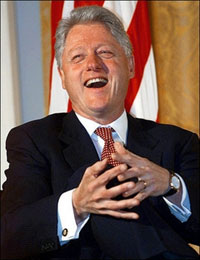|
 |
|
Then-US President Bill Clinton laughs as introductions are made in the East Room of the White House during a 2001 awards ceremony.
|
Listening to candidates debate may not be the best way of guessing who will win an election.
A study by two US universities found that people were better at predicting election winners solely1 on the candidates' appearance rather than hearing what they have to say.
"We found that snap decisions based on charisma2 are a good predictor of election outcomes," research co-author Daniel Benjamin of Dartmouth College said in a statement.
Moreover, co-author Jesse Shapiro of the University of Chicago said: "Hearing what they say makes you worse at predicting."
The study used 10-second long silent video clip extracts of debates from 58 gubernatorial elections between 1988 and 2002. Some 264 subjects participated in the study.
The video clips did not give the candidate's name or party affiliation3, and the segments were always of debates between two white male candidates to eliminate race and gender4 wild cards .
Based on this limited information, the volunteers were asked to guess which candidate had won. The study found that the subjects were quite good at guessing the winner.
The research, however, was unable to determine which physical attributes gave a candidate the edge.
"There is something mysterious about it," Shapiro said. "People's readings of physical attractiveness are not very predictive. It's who they think would win. It's not just who is good looking, it's something else."
With the audio on, subjects were no better at predicting an outcome, Shapiro said.
According to Benjamin, the research "may help to explain for example why experts forecasters, who are highly informed about and attentive5 to policy matters, have been found to perform no better than chance in predicting elections."
The study, however, did not predict who had the charisma to win the races in Tuesday's US legislative6 and gubernatorial elections.
|
 收听单词发音
收听单词发音 
